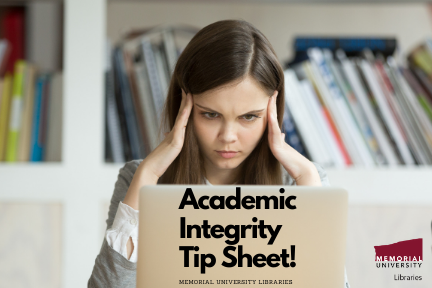Academic Integrity Tip Sheet

March 18, 2021
Academic Integrity Tip Sheet
The online and remote teaching and learning environment caused by the COVID-19 Pandemic can be challanging. Make sure you are making the right choices as you prepare for your exams and end of semester work. If you aren't sure about matters relating to academic integrity, ask us. We can help. Here are a few things to keep in mind:
Online tests and exams:
- You are only permitted to bring the items specified by your professor to your test or exam. Unauthorized devices (cellphones, calculators, translators or dictionaries, etc.) are not permitted during tests or exams, even if you are not using them. This also applies to tests written online: you cannot have your cell phone or other unauthorized aid with you, even if you don’t use it.
- Using “Homework help” sites is also considered cheating. Examples include:
- Uploading an exam or assignment question to a website and asking for a solution.
- Copying a solution you found on a website and submitting it for an assignment, test, or exam.
- Even if you post the question and don’t receive an answer or don’t use the answer you receive, you have still committed academic misconduct.
- Being in contact with other students while writing a test or exam is also cheating if you are not given permission to collaborate. Other students can be “unauthorized aids.”
- Obtaining or sharing questions or answers to an upcoming test or exam is academic misconduct.
Collaborative Work:
- Unless your professor has given permission for students to work on individual assignments together, it is not acceptable to work on individual assignments as a group. Sure, you might want to chat about your approach with classmates, but be sure that you write your own assignment, and share it only with your professor.
- If you’re not sure about your professor’s expectations about an assignment and group work, ask for clarification. It’ll help you and your classmates to work with integrity.
Plagiarism:
- Plagiarism means using someone else’s words, images, or ideas and presenting them as your own. All information (including data, tables or charts) you take from other sources must be cited in your assignments and reports. Citation guidelines are available for you to use.
- Students at Memorial University are expected to produce their own work. Buying or borrowing someone else’s work is considered cheating.
- You must produce new work for each course you do. If you have previously submitted work in one course (or for a work term report, for example), you cannot submit the same work in another course unless you get specific permission to do this from your professors.
- It is not acceptable to change your answers on a test or assignment after it has already been submitted and graded.
Academic Misconduct:
- All academic offences are taken seriously, even if it is your first time.
- "But I didn't know" will not excuse you from the consequences of academic misconduct.
- Academic misconduct can be discovered years after you've graduated and can affect your career and accomplishments. To learn more about potential breaches of academic integrity, see the Memorial University Calendar:
- For more info, visit: https://www.library.mun.ca/researchtools/guides/integrity/
